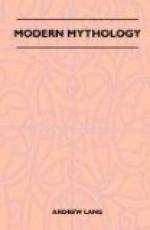’What goes before shows adequately that I am an ally, much more than an adversary, of the new school, whether styled ethnological or anthropological. It is true that all the ideas advanced by its partisans are not so new as they seem. Some of us—I mean among those who, without being vassals of the old school, were formed by it—had not only remarked already the defects of the reigning method, but had perceived the direction in which researches should be made; they had even begun to say so. This does not prevent the young school from enjoying the great merit of having first formulated with precision, and with the energy of conviction, that which had hitherto been but imperfectly pointed out. If henceforth mythological science marches with a firmer foot, and loses much of its hypothetical character, it will in part owe this to the stimulus of the new school.’
‘Braves Gens’
Professor Tiele then bids us leave our cries of triumph to the servum imitatorum pecus, braves gens, and so forth, as in the passage which Mr. Max Muller, unless I misunderstand him, regards as referring to the ’new school,’ and, notably, to M. Gaidoz and myself, though such language ought not to apply to M. Gaidoz, because he is a scholar. I am left to uncovenanted mercies.
Professor Tiele on Our Merits
The merits of the new school Professor Tiele had already stated:—{26}
’If I were reduced to choose between this method and that of comparative philology, I would prefer the former without the slightest hesitation. This method alone enables us to explain the fact, such a frequent cause of surprise, that the Greeks like the Germans . . . could attribute to their gods all manner of cruel, cowardly and dissolute actions. This method alone reveals the cause of all the strange metamorphoses of gods into animals, plants, and even stones. . . . In fact, this method teaches us to recognise in all these oddities the survivals of an age of barbarism long over-past, but lingering into later times, under the form of religious legends, the most persistent of all traditions. . . . This method, enfin, can alone help us to account for the genesis of myths, because it devotes itself to studying them in their rudest and most primitive shape. . . . ’
Destruction and Construction
Thus writes Professor Tiele about the constructive part of our work. As to the destructive—or would-be destructive—part, he condenses my arguments against the method of comparative philology. ’To resume, the whole house of comparative philological mythology is builded on the sand, and her method does not deserve confidence, since it ends in such divergent results.’ That is Professor Tiele’s statement of my destructive conclusions, and he adds, ’So far, I have not a single objection to make. I can still range myself on Mr. Lang’s side when he’ takes certain distinctions into which it is needless to go here. {27}




